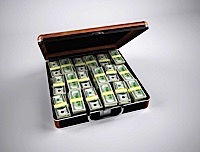
This winter, sixty five graduate students studying for their Masters of Financial Engineering earned, on average, an annual salary of $94,068 working at Wall Street firms. As interns.
The generic term for what the students are studying to become is "quants," financial engineers that (generally) design trading systems.
Four years ago, $90,000 was about the average starting base salary paid to quants who had already graduated. But this year, at least 65 graduate students made that much as interns (the actual number of graduate student "quant" interns is undoubtedly much higher).






 What if your pajamas could tell you how well you slept? That's the dream of startup Nyx Devices, which has developed a nightshirt embedded with fabric electronics to monitor the wearer's breathing patterns. A small chip worn in a pocket of the shirt processes that data to determine the phase of sleep, such as REM sleep (when we dream), light sleep, or deep sleep.
What if your pajamas could tell you how well you slept? That's the dream of startup Nyx Devices, which has developed a nightshirt embedded with fabric electronics to monitor the wearer's breathing patterns. A small chip worn in a pocket of the shirt processes that data to determine the phase of sleep, such as REM sleep (when we dream), light sleep, or deep sleep. Bridge Investment Fund recently scored its biggest win — in the eyes of job-creation-conscious local investors, at least — when Israel-based portfolio company IceCure decided to establish its U.S. headquarters in Cleveland.
Bridge Investment Fund recently scored its biggest win — in the eyes of job-creation-conscious local investors, at least — when Israel-based portfolio company IceCure decided to establish its U.S. headquarters in Cleveland. ABU DHABI // The emirate will almost double its annual green-energy prize to $4 million, organisers have announced.
ABU DHABI // The emirate will almost double its annual green-energy prize to $4 million, organisers have announced. Oakland County's Automation Alley will team up with former Chrysler CEO Tom LaSorda to help entrepreneurs realize their big ideas.
Oakland County's Automation Alley will team up with former Chrysler CEO Tom LaSorda to help entrepreneurs realize their big ideas. Science and engineering research space at the nation's top research universities grew by 4 percent in 2008 and 2009, compared with the previous two-year period, reflecting a rebound in the expansion rate after a slowing trend that reached a low point in 2006 and 2007, according to a new report from the National Science Foundation.
Science and engineering research space at the nation's top research universities grew by 4 percent in 2008 and 2009, compared with the previous two-year period, reflecting a rebound in the expansion rate after a slowing trend that reached a low point in 2006 and 2007, according to a new report from the National Science Foundation. Next time you want to give your kid a Rolo, think twice. You could be either teaching your kid to become a criminal or a CEO.
Next time you want to give your kid a Rolo, think twice. You could be either teaching your kid to become a criminal or a CEO. Economic analysis reported by the Small Business Administration shows that small companies “create more than half of the nonfarm private gross domestic product (GDP)” and “employ just over half of all private sector employees.” That level of economic impact makes encouraging small business economically important to government officials.
Economic analysis reported by the Small Business Administration shows that small companies “create more than half of the nonfarm private gross domestic product (GDP)” and “employ just over half of all private sector employees.” That level of economic impact makes encouraging small business economically important to government officials. French President Nicolas Sarkozy opened up the eG8 Forum in Paris with a keynote speech and interview with Publicis Groupe CEO Maurice Levy and journalists.
French President Nicolas Sarkozy opened up the eG8 Forum in Paris with a keynote speech and interview with Publicis Groupe CEO Maurice Levy and journalists.  ccording to the latest BizExchange Index, the volume of businesses for sale has increased in the first quarter of 2011, potentially driven by an aging population. However, younger generations are not in a position to buy.
ccording to the latest BizExchange Index, the volume of businesses for sale has increased in the first quarter of 2011, potentially driven by an aging population. However, younger generations are not in a position to buy. I got a bunch of great suggestions in my kickoff post on this topic last week. Based on that feedback, the series is going to look like this:
I got a bunch of great suggestions in my kickoff post on this topic last week. Based on that feedback, the series is going to look like this: What is remarkable about comparing Hawaii with mainland states is that the atmosphere or climate here works against entrepreneurship, that is, it is difficult for folks who have a great idea about starting up a business or new enterprise to actually break into the market.
What is remarkable about comparing Hawaii with mainland states is that the atmosphere or climate here works against entrepreneurship, that is, it is difficult for folks who have a great idea about starting up a business or new enterprise to actually break into the market. Last week, the X Prize Foundation announced a new $10 million contest to develop a portable device that can diagnose a wide range of diseases with the same accuracy as a panel of board-certified physicians.
Last week, the X Prize Foundation announced a new $10 million contest to develop a portable device that can diagnose a wide range of diseases with the same accuracy as a panel of board-certified physicians.
